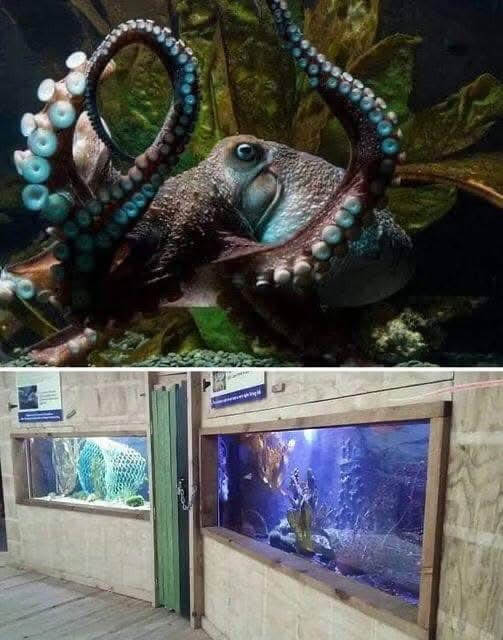In 2016, an octopus named Inky the Octopus broke out of the National Aquarium of New Zealand.
During the night, Inky managed to get away by crawling across the floor, down a drainpipe to the Pacific Ocean, (Hawke’s Bay, east coast of New Zealand’s north island) through a hole in the top of his tank.
When the aquarium employees showed up for work and saw a water trail from Inky’s tank to the drainpipe, they realized that Inky had escaped. They thought a handler might have left his tank’s top open a little.
A local fisherman caught Inky, a common New Zealand octopus, and gave it to the aquarium. According to the aquarium manager, Inky was curious, amiable, and a little smarter than they initially believed.
Eight-limbed and soft-bodied, octopuses belong to the Octopoda order. With about 300 species, the order is categorized under the class Cephalopoda, which also includes nautiloids, cuttlefish, and squids. Similar to other cephalopods, octopuses have two eyes and a beaked mouth at the centre of their eight limbs.
Octopuses can squeeze through narrow spaces because of their soft bodies’ ability to drastically change shape. They swim with their eight appendages following them. By releasing a jet of water, the siphon is utilized for both breathing and movement. Of all the invertebrates, octopuses are among the most intellectual and behaviorally varied. They also have a sophisticated neurological system and exceptional vision.
Octopuses live on the seafloor, in pelagic waters, and on coral reefs, among other places in the ocean. The majority of species are short-lived, fast-growing, and mature early.
In the majority of species, the female deposits fertilized eggs in a den and tends to them until they hatch, at which point she also dies, while the male uses a specially modified arm to carry a bundle of sperm directly into the female’s mantle cavity, following which he turns senescent and dies.
The ability to jet through the water swiftly and hide, the employment of camouflage and threat displays, the discharge of ink, and even lying are some of their defence mechanisms against predators. Only the blue-ringed octopuses are known to be lethal to humans, however other octopuses are poisonous.
According to the aquarium manager, Inky was probably exploring the sea floor in his native habitat and they had no intention of looking for him. However, as adults usually only survive for two years and die after breeding, a teuthologist from the University of Otago believes that Inky may have died.







